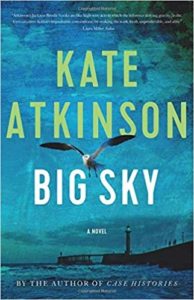 It’s been nearly a decade since the world heard from Jackson Brodie, the sardonic private eye at the heart of British novelist Kate Atkinson’s series of mysteries.
It’s been nearly a decade since the world heard from Jackson Brodie, the sardonic private eye at the heart of British novelist Kate Atkinson’s series of mysteries.
He was probably glad to have a vacation.
Brodie has been through a lot in the course of his adventures, not least a seemingly perpetual midlife crisis, which he wrestles with at least as often as heavies and thugs. The character’s appeal has always been as something of an audience surrogate, an everyman who finds the regular world quite confusing enough, even without the vast conspiracies and murders that make up his professional life. But now the sabbatical is over, and Brodie is back in Atkinson’s newest novel, “Big Sky.”
Atkinson, one of the most celebrated writers of crime and literary fiction in the UK, has been plenty busy during Jackson Brodie’s absence. Since 2010, she produced two Costa Award-winning novels (“Life After Life” and “A God in Ruins”) and a spy novel (“Transcription”). In interviews around the release of “Big Sky,” she’s allowed that she was worried about “writing herself out” and so gave Brodie a break.
“Big Sky,” unfortunately, proves that Atkinson may have had the right idea. The novel has moments where it’s as gripping as Brodie’s earlier adventures, but in this fifth volume, it’s getting easier to see the similarities to previous installments. Loutish husbands behaving suspiciously, underappreciated wives with hidden depths, a nebbish-y innocent caught up with criminals quite by accident; the characters in the story’s web are a lot like folks we’ve met before. “Big Sky” is a bit like playing Jackson Brodie Mad Libs.
As in other Brodie adventures, Atkinson take this sprawling, seemingly disparate cast and slowly reveals the invisible threads that tie them together. This time around, the bad guys are sex traffickers and pedophiles, subject matter not for the faint of heart. To her great credit, Atkinson handles the material in a way that is sensitive but pulls no punches; the horror of the crimes hits you in the gut. The story shows how acts of evil reverberate forward through the generations—it isn’t just the immediate victims of sexual abuse who suffer.
But again, we’ve been here before. Jackson Brodie’s debut, Atkinson’s stellar “Case Histories” covered similar ground, and with a more intricate, surprising plot. Big Sky is a solid page-turner, but the freshness of Atkinson’s earlier efforts just isn’t there.
In all fairness, a pretty-good Kate Atkinson novel is still better than most people’s great ones. Atkinson’s dry wit crackles on the page as freshly as ever—at one point Brodie muses that living with his teenage son is like “living inside an argument.” Atkinson is masterful at saving out one key detail that changes the context of everything you just read and leaving it until the end of a sentence, a chapter, or the whole novel. “Big Sky” isn’t Atkinson’s finest work, but only because that’s such a high bar.









